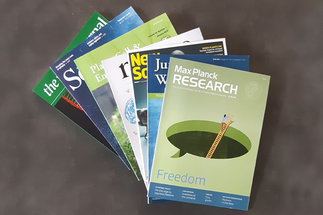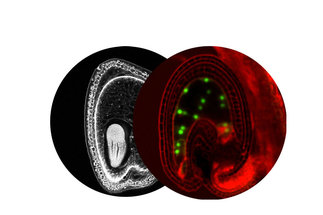Epigenetic Mechanisms of Plant Reproduction
The main goal of the research in the group "Epigenetic Mechanisms of Plant Reproduction" led by Prof. Dr. Claudia Köhler is to understand the molecular events regulating seed development and plant speciation.
The main interest of the group focuses on seeds and in particular on the endosperm, which supports embryo growth, similar to the placenta in mammals. The endosperm is a major source of human calories; one of many other reasons to study endosperm development. Embryo and endosperm development are closely connected and both tissues exchange signals; nevertheless, the nature of the signals and their role for seed development remain largely unknown. The peculiar genome composition of the endosperm with two maternal and one paternal genome renders the endosperm prone to epigenetic regulation; which we aim to explore. The endosperm is furthermore a major barrier in response to interspecies hybridization; we seek to understand the genetic basis of endosperm-based hybridization barriers and their impact on angiosperm evolution.
Using a combination of genetics, genomics, epigenomics, and evolutionary biology, we are currently exploring the following projects:
- Genetic basis and evolutionary relevance of endosperm-based hybridization barriers
- Mechanism and relevance of genomic imprinting
- Role of MADS-box transcription factors for endosperm development and evolution
- Functional role of transposable element and small RNAs for plant reproduction
Genomic imprinting is an epigenetic phenomenon rendering alleles to be specifically active depending on their parent-of-origin. In plants, imprinted genes are mainly confined to the endosperm, a tissue regulating the nutrient transfer from the mother to the offspring. Our research focuses on elucidating the functional role of imprinted genes for endosperm development.
more
MADS-box transcription factors (TFs) are ubiquitous in eukaryotic organisms and play major roles during plant development. Nevertheless, their function in seed development remains largely unknown. We have shown that the imprinted Arabidopsis thaliana MADS-box TF PHERES1 is a master regulator of paternally expressed imprinted genes.
more
Seed development in flowering plants is initiated by double fertilization of two female gametes by two sperm cells; fertilization of the haploid egg cell will generate the diploid embryo, while fertilization of the diploid central cell will generate the triploid endosperm. The endosperm serves to nourish and support the embryo by delivering nutrients acquired from the mother plant.
more
Polyploidization is a widespread phenomenon among plants and is considered a major speciation mechanism. Polyploids have a high degree of immediate post-zygotic reproductive isolation from their progenitors, as backcrossing to either parent will produce mainly nonviable progeny. This reproductive barrier is called triploid block and is caused by malfunction of the endosperm.
more
Plants that differ in ploidy are reproductively isolated by a hybridization barrier that is established in the endosperm, referred to as triploid block. Our work uncovered a new pathway leading to the formation of small RNAs from transposable elements that establish a hybridization barrier in the endosperm.
more








